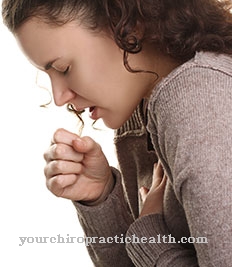Under one Summer flu a flu-like infection is understood in the summer time. However, the symptoms are not as pronounced as with influenza.
What is summer flu?

© rcfotostock - stock.adobe.com
At a Summer flu it is basically a simple cold that occurs especially in the months of June, July and August. Despite the colloquial term summer flu, however, only the mild symptoms of a flu-like infection appear and not the pronounced symptoms of influenza (real flu).
The triggers of the summer flu are enteroviruses such as Coxsackie viruses or echoviruses, while the real flu is caused by influenza viruses. The symptoms of a summer cold are similar to those of a conventional flu infection.
causes
Viruses, primarily enteroviruses, are responsible for the outbreak of summer flu. Enteroviruses occur all over the world and can multiply in the intestines. From there they are excreted from the organism with the stool. In contrast to common cold viruses, enteroviruses spread through smear infections.
In the event of inadequate hygiene, it is possible that the affected person passes the enteroviruses on with a handshake. By inhaling droplets that are released by coughing or sneezing, the pathogens rarely enter the body. It can sometimes take two to four weeks for the disease to break out. With normal cold viruses, the incubation period is only three to four days.
The germs find an ideal inlet port when the body is already weakened. This can be dry or irritated mouth and nasal mucous membranes. In addition, the large temperature differences that prevail in the summer months also play an important role.
So they represent a great challenge for the body's defense system. If the heated body cools down too much due to open car windows, air conditioning or the consumption of cold drinks, this leads to an increasing dehydration of the organism. This in turn increases the risk of summer flu.
Other possible causes of summer flu are too long sunbathing or an insufficient intake of fluids. This also weakens the immune system and makes it more susceptible to virus attack.
Symptoms, ailments & signs
The typical symptoms of a summer flu are the same as those of a flu-like infection in autumn and winter. The patients initially suffer from colds, sore throats, fatigue and headaches. As the disease progresses, sore throats, coughs, body aches, chills and fever may develop.
In some cases, abdominal pain, diarrhea or vomiting are also possible because the summer flu is accompanied by a gastrointestinal infection. The affected people feel weak and sick. As a rule, summer flu is not dangerous.
However, there is a risk of complications in people who have previously had a weakened immune system or in babies. In the worst case, there is a risk of heart valve inflammation or meningitis (meningitis) with fatal outcome.
Children are particularly affected by summer flu, but in most cases the disease takes a harmless course. It is not uncommon for the virus that causes it to be transmitted in daycare or kindergarten.
Diagnosis & course of disease
If the patient suffers from severe symptoms or if the symptoms persist for a long time, a visit to a doctor is recommended. The doctor can usually make the diagnosis based on the description of the symptoms. He'll also do a physical exam, taking a closer look at the throat and throat to find any redness or swelling.
Swollen nasal mucous membranes and swellings in the lymph nodes are important indications. If necessary, the doctor has the option of having a stool sample or a blood sample. This is then analyzed in a laboratory. As a rule, the diagnosis of summer flu does not present any difficulties.
Summer flu lasts an average of seven days. Those who take care of themselves physically, drink plenty of fluids and ventilate their room at regular intervals can shorten the period of illness a little.
Complications
The elderly, children, and people with immunodeficiency are particularly susceptible to complications from the summer flu. They often develop pneumonia or inflammation of the middle ear, sinuses, and other internal and external organs in connection with influenza. Existing lung diseases such as bronchitis, asthma or chronic obstructive pulmonary disease can become worse.
In addition to these bacterial superinfections, summer flu can also cause cardiovascular diseases and chronic heart damage. Inflammation of the brain or spinal cord can damage muscle tissue and the central nervous system. A typical secondary illness is Reye's syndrome, in which the liver and brain are damaged. If it is severe, summer flu can cause chronic illnesses or even be fatal.
Various side effects and interactions are conceivable in the drug treatment of summer flu. Oseltamivir and similar drugs can cause gastrointestinal complaints, anaphylactic reactions and edema, among other things. In rare cases, secondary diseases such as Stevens-Johnson syndrome or toxic epidermal necrosis can occur. Serious damage to the kidneys, liver, heart and lungs can occur as a result of prolonged use. In addition, addictive behavior and the resulting addiction can develop.
When should you go to the doctor?
On average, a summer flu lasts seven to ten days, with an improvement being noticed as early as the third day. If the symptoms worsen, if the summer flu lasts longer or if there is a high fever, a doctor should be consulted. If the cold cannot drain from the frontal and paranasal sinuses, it will stick. This leads to inflammation. In the case of severe headaches in connection with the summer flu, especially when bending over, a frontal or sinus infection can be assumed. It should be treated by your family doctor or your ear, nose and throat specialist.
It also makes sense to visit one of the aforementioned doctors if the cold looks yellow-green. Bacteria that are treated with an antibiotic can be responsible for this. If you have trouble breathing as a result of the summer flu, this is a possible sign of pneumonia. This assumption must also be clarified by the family doctor or the pulmonologist. The immune system is weak in young children, the elderly and the chronically ill. If you have a summer flu with severe symptoms, you should see your doctor immediately.
Treatment & Therapy
When treating summer flu, the focus is on relieving symptoms. It is important to cure the infection consistently and to stay in bed for a few days, even if the summer weather is nice. During the recovery phase, the body needs a lot of rest above all. Rinsing the nasal mucosa with salt is also considered helpful. Due to the high salt content, the mucous membranes can be disinfected and soothed.
To strengthen the immune system, more vitamins and minerals can be administered to the body. Zinc, vitamin C and magnesium are particularly recommended. The use of tried and tested home remedies such as ginger is also helpful in the event of a summer flu. For this purpose, four to five slices of ginger are boiled and taken as a tea.
Sage tea and chamomile tea, which can be administered as a gargle solution, also have anti-inflammatory properties. It makes sense to put on leg compresses or take a sweat cure with lime blossom tea or elderflower tea against fever. Other possible treatments are quark compresses around the neck, lozenges for sore throats from the pharmacy and fennel and eucalyptus for coughs.
prevention
In order to avoid the summer flu in the first place, it is important to avoid cooling down the body. The air conditioning should therefore not be set too high in the car or in the office. It is also better to refrain from enjoying ice-cold drinks. After bathing, wet clothes must be replaced quickly.
Summer flu expresses itself through cold-like symptoms such as cough, runny nose and general malaise. Occasionally, a fever is added to the symptoms. Intensive aftercare is not required if the course is mild. If the summer flu is more pronounced, a visit to the doctor is recommended. Treatment and aftercare are the same as for a conventional flu-like infection.
Aftercare
In the case of the summer flu, preventive measures can be taken instead of aftercare. The person concerned can contribute his or her own contribution. A healthy diet rich in vitamins protects against recurrence. Drafts from air conditioning should be avoided or reduced despite the summer heat. It encourages the irritated mucous membranes to dry out.
In addition, it is important to ensure that there is enough rest and sufficient fluid intake. However, the drinks must not be too cold or enriched with ice cubes, but should take a slight room temperature beforehand. Lukewarm chamomile or mint tea is best for this.
If there is no significant improvement in the state of health after one week, a doctor should be consulted. The prescribed medication is adapted to the respective symptoms (anti-inflammatory, decongestant, expectorant ...). An undiscovered pollen allergy can hide behind the cold. An allergist can test the person for it.
You can do that yourself
Those affected can cope with the summer flu through self-help, if the course is not particularly severe. In principle, the same measures apply as for classic winter flu or cold. In addition, special consideration must be given to the warm outside temperatures and the associated frequent loss of fluid in the affected patients. However, as a precaution, the doctor should be consulted in the event of accompanying illnesses.
The liquid is best balanced with water and herbal or fruit teas, which can also be drunk cool in the warm season. If you have a fever, cooling calf compresses are a tried and tested home remedy, while the upper airways can be cleared through inhalations. Basically there is nothing wrong with fever-free patients staying outdoors such as in the garden, but a place in the shade is advisable here. It is also important that those affected do not dress too airy due to the warm temperatures.
The summer flu is often triggered by enteroviruses and is therefore not infrequently associated with abdominal pain and nausea. Here self-help also means protecting the gastrointestinal tract. You should avoid sweets and fats as well as alcohol and too much coffee. Anyone who smokes should stop nicotine consumption, at least in the acute phase of the disease, so as not to put even more strain on the airways.


.jpg)


.jpg)





















